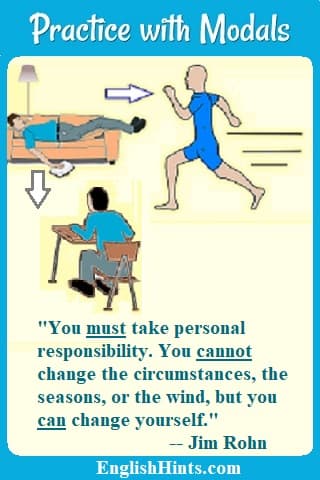Practice with Modals
Modals are helping verbs that affect the exact meaning of the main verb. They show how possible, definite, or necessary some action is.
They never change form, and the verb that follows them is always in the base form. If you aren’t sure about how to use them, read Modal Verbs before trying these practice exercises.
A Few Examples Using Various Modals
“Yesterday Jim couldn’t go to the park, but today he can."
“When will Joe get here?”
“He should arrive between 8 and 9:30 this evening.”
“Jean would like to go, but she can’t. She must not miss any more school.”
“May I leave now?” (In casual conversation we often use ‘can’ or ‘could,’ but ‘may’ is the most correct way to ask permission.
“Do you think it will rain?”
“It might, but I doubt it.”
* * *
Uncle Joe: “When will you finish your school project?”
Susie: “If I work really hard on it, I might be done by Friday.”
UJ: “Can you type fairly well?”
S: “I wish I could, but I can’t. I have to hit the keys one at a time, so it takes me longer.”
UJ: “Well, you should stay off Facebook until you get it done. If you don’t work on it now, you probably won’t be able to go to the zoo with us Saturday.”
* * *
Jack: “What are your most important goals for the next five years?”
Tom: “I would like to get a better job so we can rent a nicer house. I would also like to become a citizen.”
J: “If you want to become a citizen, you must meet specific requirements. You should study American history and government. You might have to wait a while before you qualify for citizenship. Once you qualify, you must take a citizenship test.
If you can pass the test and meet the other requirements, then you may become a citizen.”
Modals Practice
This practice exercise has two parts. In the first one, the modals have been done for you. Fill in the main verbs that make the most sense in the conversation. (Several have more than one possible correct answer.)
In the second part you need to choose the modal verb that fits.
The verb choices for Part 1 are:
become, get, go, pass, study, take, talk
Part 1: Asking about How to Become a Nurse
See Giving Advice for more practice with modals, especially 'should' and 'must.'
Home> Grammar Practice> Modals Practice.
Didn't find what you
needed? Explain what you want in the search box below.
(For example, cognates, past tense practice, or 'get along with.') Click to see the related pages on EnglishHints.
| site search by freefind | advanced |






